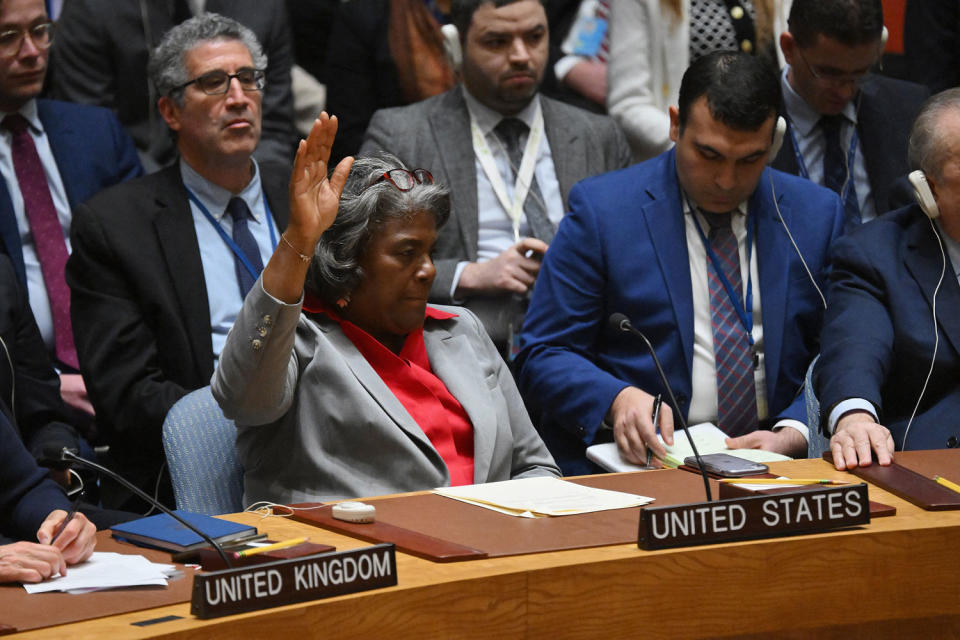A resignation, rescheduled talks and rising public opposition: U.S. ire grows over war in Gaza
- Oops!Something went wrong.Please try again later.
TEL AVIV — Israel has agreed to reschedule talks on Gaza that it called off in protest just days ago, an apparent effort to mend a growing rift with Washington over the war that was highlighted Wednesday by the resignation of a State Department official and new polling showing that a majority in the United States now disapprove of its ally’s conduct.
The official, Annelle Sheline, who was focused on human rights issues in the Middle East, told NBC News she felt she had no choice but to publicly resign as the death toll in the Gaza Strip has soared past 32,000 people and as warnings of an imminent famine in the Palestinian enclave reach a fever pitch.
Sheline said she decided to quit in protest over ongoing U.S. diplomatic and military support for Israel.
She said in a phone interview Wednesday that she no longer wanted to be affiliated with a government that she said was “enabling what has credibly been described as a genocide,” a charge both Israel and the U.S. have vehemently rejected.
“I have a young daughter,” Sheline said. “Someday reading about this in school, she might ask, what did I do?” she said. “I want to be able to tell her that I tried to do as much as I could.”
The Biden administration has stepped up its criticism of Israeli Prime Minister Benjamin Netanyahu and this week allowed a United Nations Security Council resolution calling for an immediate cease-fire in Gaza to pass.

Netanyahu responded by scrapping a planned visit by a high-level delegation to Washington for talks over the Israeli military’s plan for a ground offensive on Rafah, where more than 1 million people have sought refuge but Israel says its troops must enter to eliminate Hamas.
The Israeli leader has now backtracked and efforts were underway to set a new date for the talks, White House spokesperson Karine Jean-Pierre told reporters.
Despite the apparent effort to ease tensions, Netanyahu on Wednesday told a bipartisan U.S. congressional delegation that he had no intention of backing away from an offensive on Rafah.
“Victory is within reach. It’s a few weeks away,” he said at the event, organized by the American Israel Public Affairs Committee in Jerusalem. But, he said, “now we’re told, ‘You can’t do this. If you go into Rafah, you’re going to have a humanitarian catastrophe.'”
Addressing concerns over the safety of the displaced Gazans sheltering there, including many children, Netanyahu suggested that “they can move” farther north — despite the fact that much of the infrastructure across the territory has largely been destroyed in Israel’s offensive, while access to aid in northern Gaza remains limited.

'Moving the needle'
But despite this growing clash between the two governments, some feel the United States has done too little to press its ally to change course in Gaza.
Sheline, who first shared her account with The Washington Post, was recruited to join the State Department as a foreign affairs officer in the bureau of Democracy, Human Rights and Labor as part of an Arabic language fellowship connected to her Ph.D. program — and she quit last week just halfway into her two-year contract.
Sheline said that U.S. policy toward Israel had made her job "almost impossible," whether it was civil society groups simply not wanting to engage with U.S. officials over the country's backing of Israel or fearing that engagement with the U.S. government would put them at greater risk.
Sheline said she tried to raise her concerns internally, signing onto dissent cables and speaking with her supervisors, as well as in open forums, but to no avail.
“I personally was not expecting to shape policy but it became clear that even moving the needle in a tiny way from the inside just wasn’t going to work," she said.
State Department spokesperson Matt Miller has acknowledged a diversity of internal views on the war in Gaza, but said that while Secretary of State Antony Blinken welcomes employees to "speak up and challenge his thinking," that doesn't mean it will lead to a shift in U.S. policy.
Miller told reporters Wednesday that was ultimately up to President Joe Biden and senior leaders in his administration.
Sheline is the second State Department official to publicly resign citing U.S. policy toward Israel since the war began nearly six months ago after Hamas' Oct. 7 attacks, in which Israeli officials say 1,200 people were killed and around 260 others were taken hostage, with more than 100 still held captive in Gaza.
In October, veteran State Department official Josh Paul left his post with the agency’s Bureau of Political-Military Affairs after more than a decade, citing the U.S.' “blind support” for Israel.
Sheline's decision to follow suit came as a Gallup poll released Wednesday found that growing numbers of Americans now oppose Israel’s military action in Gaza, an apparent shift in U.S. views.
The poll, conducted from March 1 to March 20, found that 55% of respondents said they disapprove of Israel's actions in Gaza, compared with 45% who expressed disapproval in November.
The share of those in favor of Israel's actions fell from 50% in November to 36% in March, while the percentage of those who said they had no stance rose from 4% to 9%.
The poll, which surveyed 1,016 adults living across all 50 states and the District of Columbia, had a margin of error of plus or minus 4 percentage points.
It was carried out before the U.N. Security Council on Monday passed its resolution calling for a cease-fire for the rest of the month of Ramadan, which ends April 9.
The U.S. allowed the resolution to pass, in a change of approach.
Sheline said she was concerned that upholding the rule of law had become a political consideration for the administration, which was elected in part on a promise to re-establish U.S. leadership on everything from human rights to international institutions to climate change.
“I continue to be horrified at the largely unconditional support and providing a steady stream of weapons to Israel is considered more important than all of these other extremely significant issues,” Sheline said.
Chantal Da Silva reported from Tel Aviv, and Abigail Williams from Washington.
This article was originally published on NBCNews.com

